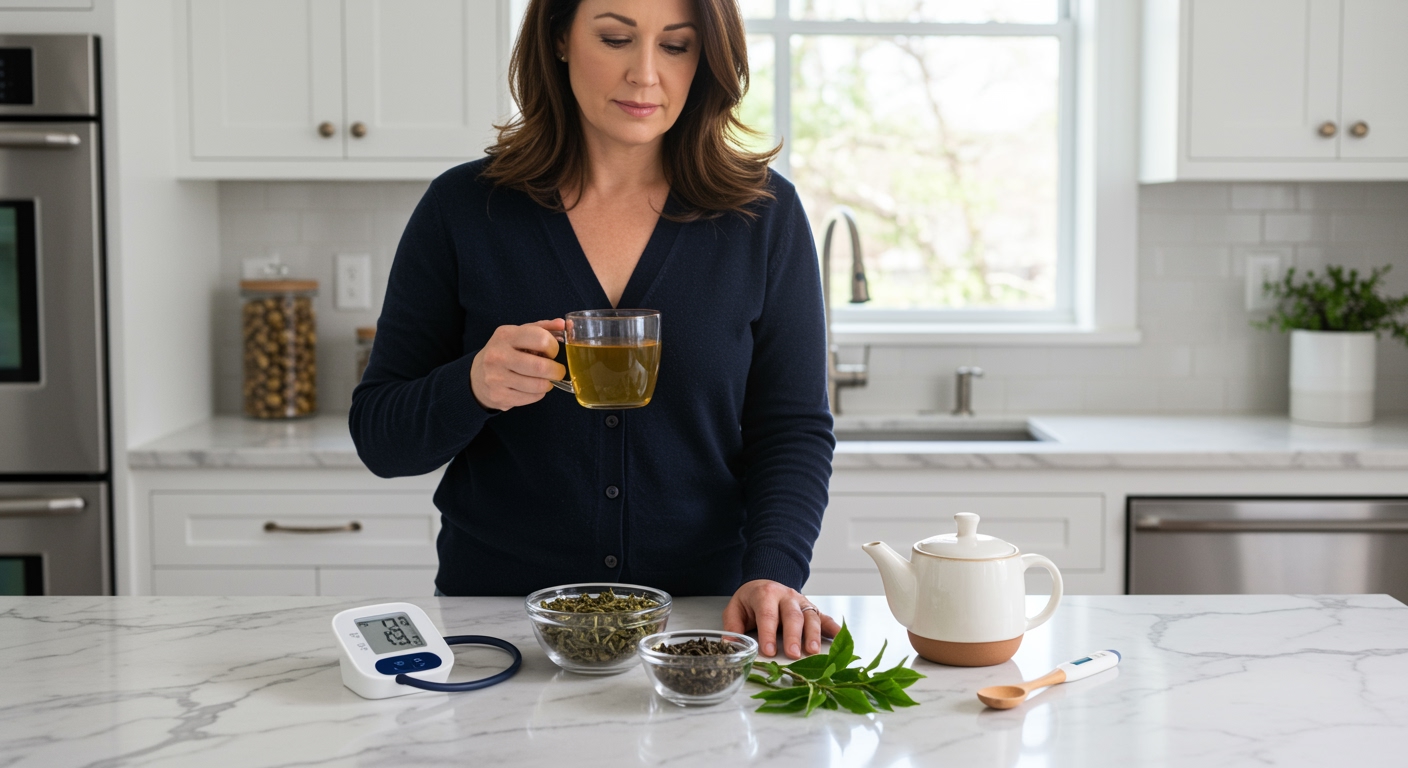✪ Key Takeaway: Green tea can potentially worsen low blood pressure due to its vasodilating compounds, but effects vary by individual.
Introduction
You sip your morning green tea thinking you are doing something healthy for your body.
But what if this beloved beverage is actually making your low blood pressure worse and leaving you feeling dizzy and weak throughout the day.
Hi, I am Abdur, your nutrition coach and today I am going to explain how green tea consumption can affect people with hypotension and what you need to know to make informed decisions about your daily tea habits.
How Does Green Tea Actually Affect Blood Pressure?
Green tea contains several bioactive compounds that directly influence your cardiovascular system.
The most important compound is epigallocatechin gallate or EGCG, which makes up about 50-80% of the total catechins in green tea.
EGCG works by promoting the production of nitric oxide in your blood vessel walls.
Nitric oxide acts as a powerful vasodilator, which means it causes your blood vessels to relax and widen.
When your blood vessels dilate, the pressure inside them naturally decreases because the same amount of blood now has more space to flow through.
Research shows that regular green tea consumption can reduce systolic blood pressure by 2-3 mmHg and diastolic pressure by 1-2 mmHg in healthy individuals.
✪ Fact: Green tea contains 25-50mg of caffeine per cup compared to coffee’s 95mg, but even this amount can affect blood pressure.
What Happens When You Already Have Low Blood Pressure?
If your blood pressure is already below normal levels, green tea can potentially push it even lower.
Normal blood pressure ranges from 90/60 to 120/80 mmHg, and anything below 90/60 is considered hypotension.
When you drink green tea with existing low blood pressure, the additional vasodilation can cause your blood pressure to drop further.
This creates a cascade of symptoms including dizziness, lightheadedness, fatigue, and in severe cases, fainting.
Your brain requires a steady supply of oxygenated blood to function properly, and when blood pressure drops too low, this supply becomes inadequate.
The result is that familiar feeling of weakness and mental fog that many people with hypotension experience after drinking green tea.
✪ Pro Tip: Monitor your blood pressure for 2 hours after drinking green tea to understand your individual response pattern.
Does The Caffeine In Green Tea Help Or Hurt?
The caffeine content in green tea creates a contradictory effect on blood pressure that confuses many people.
Caffeine typically causes a temporary increase in blood pressure by stimulating your nervous system and causing blood vessels to constrict.
However, green tea contains much less caffeine than coffee, and the catechins in green tea actually counteract many of caffeine’s blood pressure raising effects.
This means that while you might get a slight initial boost from the caffeine, the overall long-term effect of green tea consumption is still blood pressure reduction.
For people with low blood pressure, this creates a problematic situation where the brief caffeine boost is quickly followed by an even greater drop in blood pressure.
Studies show that the blood pressure lowering effects of green tea become more pronounced with regular consumption over weeks and months.
✪ Note: The timing of green tea consumption matters more for hypotensive individuals than the amount consumed.
Should You Completely Avoid Green Tea With Low Blood Pressure?
Complete avoidance is not necessary for most people with mild hypotension.
The key is understanding your individual response and making strategic adjustments to your consumption patterns.
Start by reducing your daily intake to just one cup and observe how your body responds over the course of a week.
Drink your green tea with food rather than on an empty stomach to slow the absorption of its active compounds.
Consider switching to weaker preparations by steeping for shorter periods or using cooler water temperatures.
If you experience persistent dizziness, weakness, or fainting episodes after drinking green tea, then complete elimination may be necessary for your safety.
Always consult with your healthcare provider before making significant changes to your diet, especially if you take medications for blood pressure or other cardiovascular conditions.
✪ Pro Tip: Keep a blood pressure diary to track patterns between green tea consumption and your symptoms.
The Bottom Line
Green tea can indeed worsen low blood pressure through its vasodilating compounds, particularly EGCG, which promotes blood vessel relaxation and reduces blood pressure.
Your health is too important to ignore the signals your body sends you, so pay attention to how you feel after drinking green tea and adjust accordingly.
I would love to hear about your experiences with green tea and blood pressure in the comments below, and please feel free to share any questions you might have about managing hypotension through dietary choices.
References
At NutritionCrown, we use quality and credible sources to ensure our content is accurate and trustworthy. Below are the sources referenced in creating this article:
- PubMed: Green tea consumption and blood pressure: a systematic review
- Taylor & Francis Online: Effects of green tea on blood pressure in hypertensive patients
- American Heart Association: Green tea and cardiovascular health outcomes
- PMC: Green tea catechins and blood pressure regulation





